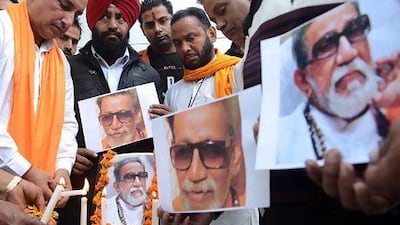NEW DELHI // Two weeks after Bal Thackeray, the leader of Mumbai's right-wing Shiv Sena party, was cremated in public, a dispute has erupted over the location of a memorial to be erected in his honour.
Thackeray, 86, was cremated in Shivaji Park, the city's largest, situated in the heart of Dadar, a suburb that has long been a Shiv Sena stronghold. At the site of the cremation, a makeshift memorial still stands: a dais, dominated by a photograph of Thackeray, lit by powerful lamps at night, and staffed by members of the Shiv Sena.
The party is demanding that a permanent memorial be built within the park, deeming his cremation spot to be sacred ground.
"The sanctity of the place should be maintained," Sanjay Raut, a Shiv Sena leader and a member of parliament, said week. "It is like a temple for us."
But the Maharashtra chief minister, Prithviraj Chavan, said Shivaji Park's status as a public park prohibited such construction on its turf. "Nothing will be done [to] violate the law," Mr Chavan said. In response, a senior Shiv Sena leader, Manohar Joshi, said: "We don't care if any law is coming in the way" of building the memorial at Shivaji Park.
Thackeray's association with Shivaji Park began long before his cremation there. The Shiv Sena party was founded in Shivaji Park in 1966 and Thackeray's annual rallies on the festival of Dussehra packed the 11-hectare space with his supporters. A bust of his late wife, Meenatai Thackeray, greets visitors at the eastern entrance to the park.
But Naresh Fernandes, a Mumbai-based author who is working on a book about the city, pointed out that the Shiv Sena did not "have a monopoly on political activity there".
"So many other political parties have also held rallies in Shivaji Park," Mr Fernandes said yesterday. "In fact, for a long time, a marker of political status in the city was if you could fill Shivaji Park for a rally or not."
Mr Fernandes said Shivaji Park was a crucial public space in an area of Mumbai that was otherwise choked with buildings. The Bombay high court has, in fact, designated the park as a silent zone. The park now provides a quiet, green oasis in the middle of Dadar. Every morning and evening, the promenade around it is filled with joggers, walkers and families.
Within the park, football and cricket coaching academies have made it their base.
It was at Shivaji Park that Sachin Tendulkar and Sunil Gavaskar, in their boyhood, refined the batting skills that later took the cricket world by storm.
"If you ask me, the mood of the residents here is that they do not want a memorial here at all. It's an encroachment. It's against the law," said Smita Kudva, a filmmaker and writer who lives on Shivaji Park's periphery, and who is active in the local residents' association.
"It should remain a playground. It should remain available for children or adults who want to play some sport," Ms Kudva said. "The politicians should leave something for the common man."
Tensions might spike over the coming week, as hundreds of thousands of Dalits pour into Shivaji Park to commemorate the anniversary of the death of B R Ambedkar, a champion of Dalit rights and the architect of the Indian constitution.
The 56th anniversary of Ambedkar's death falls on Thursday and his memorial stands just down the road from Shivaji Park.
The crowds have usually been peaceful. But the presence of the Shiv Sena this year and its bid to construct Thackeray's memorial so close to Ambedkar's could spark law-and-order concerns, said Mr Fernandes.
To mitigate these, the Republican Party of India, a Mumbai-based party that represents many Dalits, has come out in support of a memorial to Thackeray. In a front-page article on Friday in Saamna, the Shiv Sena mouthpiece, the head of the Republican Party of India, Ramdas Athavale, urged Dalits to pay their respects to Thackeray at the existing makeshift memorial.
Follow
The National
on
& Samanth Subramanian on

